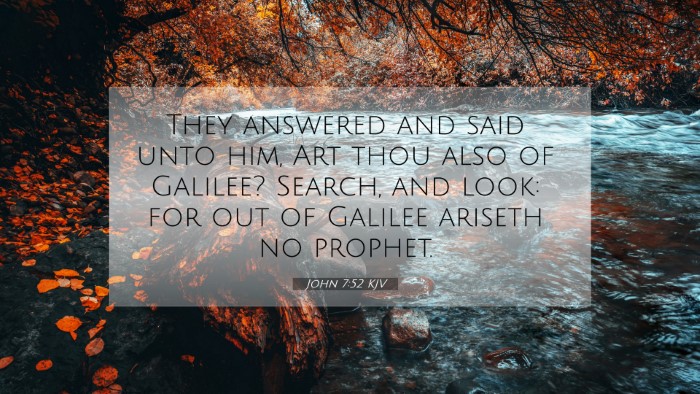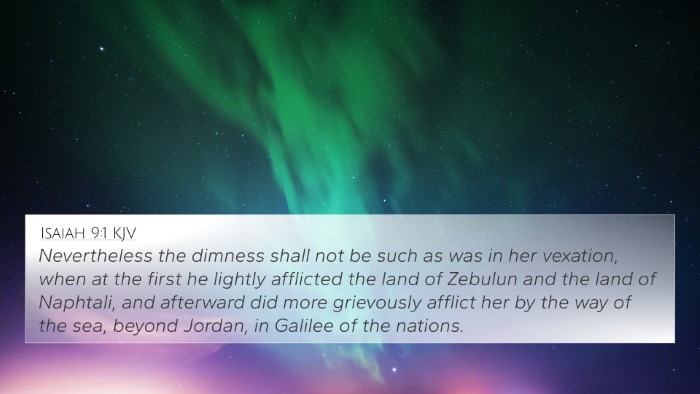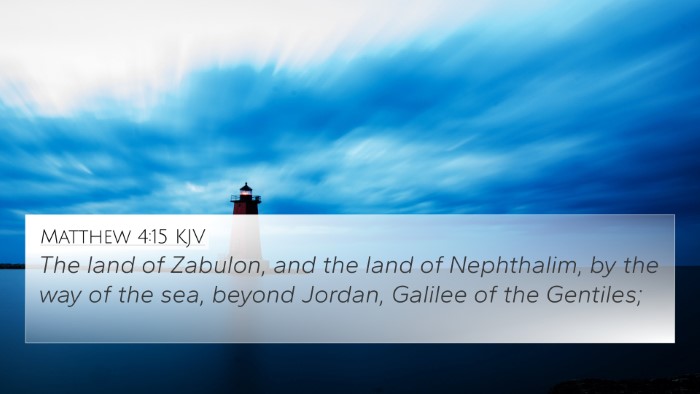Understanding John 7:52
John 7:52 presents a moment in the Gospel where the Pharisees, engaged in a heated debate regarding Jesus' identity, state:
"They answered and said unto him, Art thou also of Galilee? Search, and look: for out of Galilee ariseth no prophet."
This verse encapsulates the skepticism and prejudice prevailing among the religious leaders of the time, as they dismiss Jesus based on His Galilean origin.
Verse Meaning and Commentary
The verse showcases several critical themes, which have been elaborated upon by various public domain commentaries.
-
Matthew Henry: Emphasizes the closed-mindedness of the Pharisees, who rely on their tradition and misunderstanding of prophetic history. They fail to recognize that God's messengers can arise from unexpected places, thus exposing their bias.
-
Albert Barnes: Notes that Galilee was often viewed with contempt by Judeans. His commentary suggests that this bias illustrates the challenge of accepting truths that do not align with preconceived notions.
-
Adam Clarke: Focuses on the implications of their statement in the context of prophecy. He points out that while they assert no prophet emerges from Galilee, they overlook scriptures pointing to figures like Jonah, who was from a region nearby.
Thematic Connections
This verse not only holds significance within its chapter but also connects to various themes found throughout the Bible. Here are some key parallels and connections:
- Matthew 2:23: This verse foreshadows the fulfillment of prophecies concerning Jesus’ upbringing in Nazareth.
- Mark 1:9: Highlights Jesus' baptism in the Jordan, showing His entry into public ministry, despite origins from Galilee.
- Isaiah 9:1-2: The prophecy concerning the land of Zebulun and Naphtali—Galilee included—indicates that light would come from this region.
- Jonah 1:1: Reminds readers that prophets indeed have roots in this area, countering the Pharisees' claims.
- Acts 10:38: Peter highlights the work of Jesus in Galilee as he speaks to the realities of His ministry, showing that Galilee was central to His mission.
- Luke 4:14-15: Describes Jesus beginning His public ministry in Galilee, reinforcing the significant role of this region in His life.
- John 1:46: Nathanael’s skepticism about anything good coming from Nazareth also reflects the cultural bias against Galilean origins and is similar to the Pharisees' dismissal.
Resonance with Other Biblical Texts
The concept of recognizing prophetic voices irrespective of their origin resonates throughout the Scripture. The dismissal of Jesus based on location invites the reader to reflect on how biases can obscure one's understanding of divine truth.
Cross-Referencing Themes
In exploring the connections between Bible verses, one can uncover associated themes, such as:
- The importance of humility in accepting spiritual truths from unexpected sources.
- God’s tendency to choose the humble and lowly for great tasks, as seen in many biblical narratives.
- The role of prophecy in both Old and New Testaments, guiding believers to understand God's unfolding plan.
This cross-referencing of Biblical texts can serve as a powerful tool in personal study, sermon preparation, and deepening one's faith.
Conclusion
John 7:52 challenges readers to confront their assumptions and prejudices as they seek to understand the nature of Jesus and His ministry. Engaging with this verse through a study of its context and related scriptures furthers our appreciation for the intricacies of Biblical teachings.











